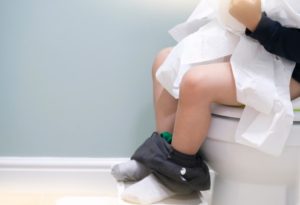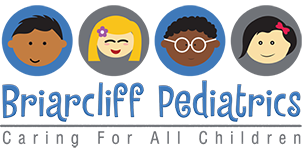Tips for Potty Training Success
- On Dec, 13, 2018
- Doctor Notes
- Latest News
 Potty training can be one of the most difficult, frustrating, and rewarding milestones of your child’s early years. There’s no shortage of opinions on this subject, and you might find many conflicting viewpoints when looking for a straightforward answer. Best practices for toilet training can vary from child to child, but as always, we recommend looking to science and the experts to find the methods that will work best for you. If you’re having trouble potty training your child or are feeling anxious about the prospect, perhaps these tips from our practice and the American Academy of Pediatrics can help:
Potty training can be one of the most difficult, frustrating, and rewarding milestones of your child’s early years. There’s no shortage of opinions on this subject, and you might find many conflicting viewpoints when looking for a straightforward answer. Best practices for toilet training can vary from child to child, but as always, we recommend looking to science and the experts to find the methods that will work best for you. If you’re having trouble potty training your child or are feeling anxious about the prospect, perhaps these tips from our practice and the American Academy of Pediatrics can help:
- Make sure they’re ready.
Remember that there is no set age at which your child will be ready for potty training (though the average age is roughly 24—36 months). If you begin the process before your child is physically and emotionally equipped, it can create unnecessary and possibly even detrimental stress for everyone involved. A child should be able to consistently sit on and rise from their potty chair, as well as understand and verbally communicate basic concepts, before starting potty training. Otherwise, he or she will be more likely to become frustrated, possibly prolonging the overall process. If you’re met with strong resistance or utter confusion, you may want to wait a few more months.
- Use positive reinforcement.
Most parents we know would rather use constructive than punitive teaching methods, so it’s a good thing that children learn best from positive reinforcement. Let your child guide the speed with which you go through the potty-training process. Many parents find that a sticker or star reward system is helpful for teaching new skills.
- Be a paragon of patience and serenity.
It will be easy to get frustrated at points along your child’s potty-training journey. However, you’ll likely achieve faster, better results if you model patience and make an effort to keep your child’s (and your own) stress level down. Moreover, it’s important that children be in a stable life situation (no big moves coming up or new siblings on the way, for example) before beginning potty training.
- Try different approaches before settling on your potty-training routine.
As a practice with decades of pediatric experience, we can confidently say that no two children are alike. Some will respond to heavily structured methods, while others will learn better with a more relaxed approach. Do your homework, try various verbal, demonstrational, and motivational techniques, and keep doing what works. You’ll likely find yourself with a tailored potty-training system that’s unique to your child.
- Be consistent.
Make sure you, your spouse, and/or a caretaker can hold daily toilet-training sessions with your child for a few months. Try and do it at the same time every day, and coordinate your approach with anyone else who might be helping with the process. Consistency will help your child build his or her abilities day-by-day, and the last thing you want to introduce into the potty-training process is confusion.
Potty training can sometimes be challenging. However, with the right attitude and knowledge, you’ll likely discover many additional teaching opportunities as your child learns this fundamental skill. Dr. Ray Deeb and Dr. Ashley Brown provide comprehensive healthcare for newborns and children up to the age of 18, and they’re currently accepting new patients. If you would like to learn more about our practice, contact Briarcliff Pediatrics to schedule an appointment or a complimentary meet-and-greet. Don’t forget to follow us on Facebook and Instagram to get the latest health tips and news in children’s healthcare, and check back often for new blogs.




